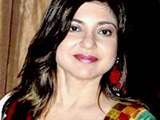Alka Yagnik INTERVIEW : A New Frontier |
| |
Music lovers are missing the frequency of your songs. We have been used to your prolific output for over fifteen years.
Frankly, I have begun to restrict my work for at least 4-5 years now, but it seemed as if I was still singing a lot because the best songs came to me and so there was a huge quantum of hits. With Anu Malik, Jatin-Lalit and Nadeem-Shravan holding center-stage along with others like Himesh Reshammiya and Rajesh Roshan things were more melody-oriented. Even A.R.Rahman gave me lovely songs in Swades and in many other films. Today, musical trends have changed towards something away from homespun music and melody, but the songs that need me still come to me. I am happy that trends are automatically helping me get more choosy! Your singing apart, are you happy with the way music is going?
A lot of people are dissatisfied - and I do not mean those of my generation or older listeners. Today's youngsters and even children find the kind of music being churned out today sub-standard and boring. They are tiring of it fast. So, as it has happened several times in the past, melody will stage a comeback and quality will return as well. Do you really think that classic melody and Indianness will ever return in this age of globalization and fusion? What about the younger generation of filmmakers and the latest group of music directors who either lack a classical grounding or have Western leanings?
Maybe some of the changes will remain, as they always have. But such music has no lasting power, so there will be a reversal. As for the music directors, I think that most of those around have the potential and capability in them to deliver strong melody. But they are not coming out with them because that side is not being tapped at all. In a way, the really committed filmmakers are also not happy. But when and how will the reversal come?
I think that the music of any timeframe has to be in tune with the subjects that are being made, especially in the case of film music that is made for a story. And the subjects in turn are based on the topical issues of that time. And yet, a good filmmaker and a good music director can find scope for evergreen music, if they can get around some hang-ups and misconceptions. Like what?
For example, today there is this belief that Indian classical music should be completely avoided for mass-appeal! And this goes to the ridiculous extent that they tell me to avoid taking the slightest murqi (modulation)in any line of any song. Why don't they realize that murqi has nothing to do with classical music? Usse sirf gaana sajtaa hai - the melody and the rhythm do not change because you have given that extra anointment that a music director wants or a singer loves to do in any song. Is there any positive side to all this?
Yes, as I said,it is helping me sing even less, and to discipline my personal and family life! I am extremely happy that in such a scenario the best melodies are coming to me, which does not mean only the serious, heavyweight kind. I have had some lovely 'today' songs in Shaadi Se Pehle, Banaras and Kabhi Alvida Naa Kehna and have got the cream of work like Umrao Jaan, Jai Santoshi Maa and others coming up. I am also getting time out to do concerts, which I was largely avoiding earlier, and I am also judging a singing talent contest for children on Sa Re Ga Ma Pa. We missed you in Fanaa.
There were certain personal reasons why I did not sing for the film, and Jatin and Lalit and Aditya Chopra were very understanding about it. So what charges you now?
Every song that comes to me charges me. I am open to singing the normal kind of songs, even frivolous ones, for music directors and banners where I have a comfort zone. But I would also like to now sing what will take me ahead. The songs that Anu Malik has given me in Umrao Jaan and Jai Santoshi Maa are genres that I have not done before, and it is really nice to know that he thought of me for them. What would be your advice to today's young singers?
Today, it is extremely easy to get breaks, be hyped and even get success. The keyword here is 'get' - because sustenance is not about platforms or lucky breaks! Today, if media-hype makes you known, you can let that initial success go easily to your head. There are softwares that even correct your pitch, so if you have a good voice you need not work hard on basics like sur. Even songs become 'hits' by promotion and hype rather than genuine approval of the people. All this is very unfortunate because the disadvantages outweigh the apparent benefits of this culture. One or two breaks or hits can make your commitment less and complacence more. Believe me, I have seen younger singers insist that they have given a great 'take' in the studio and refuse to sing again even when the music director is not satisfied! But sustenance and survival are a different ballgame. Riyaaz and always being open to learning and exploring more avenues are very important. Singers should look at forever moving one step further in terms of singing ability. Besides, they can never hope to match our success and lasting power because work has not only reduced but is divided among many more singers today. I would also advise them that career upswings and downswings are a part of the game for even the best and the biggest and what is important, if one has to survive, is that the artiste should be singing equally well in that low phase. If you achieve that, a comeback is certain, and so is the audience's love and respect for you. One should look at lean phases as a break for you - and also for the audience! I am lucky that I have now achieved - due to a mix of choice and circumstance - a certain exclusivity. Exclusivity ki qadar hamesha hoti hai! I think that I have entered a higher phase today. What are the other advantages your generation of singers had, or have, over today's singers?
The one unparalleled advantage that none of the new singers can hope to have is of singing 'live' with a 100-piece orchestra and one or more co-singers. The real test of a singer also comes from what he or she can do when singing 'live', for I have seen even famous singers falter here. We are thus stronger singers than they can ever hope to be. Every generation thinks that the next is not as accomplished. Do you subscribe to this view too?
In terms of generations, there is a definite decline with each one. We are the last of the blessed lot whose art and technique were polished with the glory and prestige of singing in 'live' recordings with master composers. That automatically created a definite mood for excelling in every song, with everyone being charged in a family-like atmosphere of warmth. Like my contemporaries, male and female, we could benefit from this as well as from our work with masters like Kalyanji-Anandji, Laxmikant-Pyarelal, R.D.Burman and all the others and become better singers, and this benefit was also reaped by the younger music directors. But compared to today's generation, I definitely feel that the era in which we did the most work was very musical compared to that of today. You have always been stressing that you have massive hopes from Umrao Jaan.
Yes. The film came to me when I was feeling bored and stagnated. Also, for me as a singer, this is the perfect time, because I think that my tonal quality is at its peak, and I have the emotional maturity as a person too. This made singing the ghazals comfortable and I could do justice to them far better than if I had got it 10 years earlier or maybe better than even a decade later. Like Lata Mangeshkar, you have had the distinction of being the first singer for so many younger heroines. How will you reconcile your vocal maturity with the young tenor needed for today's heroines and times?
I think that with maturity as a singer, this becomes easier too. The challenge is that I have to sound like me yet mould to current musical grammar and a young heroine, like say, Ayesha Takia in Shaadi Se Pehle. If you are focused it is not difficult. Finally, what do you think about being termed the natural successor to Lata Mangeshkar?
It obviously feels great because it means that I have finally reached somewhere. But I can never ever think that I have reached anywhere close to Lata-ji. Apart from my family's unstinting support, my mother's strictness about my training, my gurus V.C.Jog, the Dagar Brothers, the Birla Academy, Kalyanji-Anandji and for learning on the job Laxmikant-Pyarelal, Lata-ji has played a major part in my success just by being the singer she is. And, forget the myths like the Mangeshkar monopoly, she has always encouraged me personally and in print. So has Asha (Bhosle)-ji.
And with your singing less, there will not be accusations of a Yagnik monopoly, right?
The media has claimed that I have become insecure with the arrival of younger singers. So I can imagine how they must have fabricated the Mangeshkar monopoly too. Yes, it's another matter that they were ripping apart my singing earlier, which could have been because they thought they could please Lata-ji and Asha-ji that way!


















comment:
p_commentcount